Are you looking for a project partner?
If you need a reliable project partner, contact us. We will be glad to communicate with you.
Project “Scenarios for the development of civil society in Slovakia by 2040” (2022-2023) aimed at creating scenarios for the development of civil society in Slovakia and on their basis the creation of a hybrid training programme for civil society organisations in the field of adaptation to the new normal in the post-Covid19 and post-conflict era.

Photo by mostafa meraji on Unsplash
Before 2020, there were few people in the world who warned of the possibility of "highly unlikely events" such as a global pandemic that would shake health and security on a global scale. Few predicted ruptures in development and economic consequences that would affect the nature of work and life trends. Yes, there were isolated voices (such as Bill Gates or Nassim Nicholas Taleb) who, perhaps more on the basis of intuition than elaborate predictions, warned that "black swans in the development of society" could not be ruled out. We see that the representatives of the next generation of Alpha are more sensitive than the older generations to climate change and the urgency of the steps that need to be taken in the coming global consequences of climate change. We know that it is not "only" about nature, that it is not "only" about energy, that we are facing tectonic changes in the character of societies, migratory movements and the "new normal". These movements concern the whole world and also concern our "sleepy Slovakia", it is impossible to run away from these movements, it is impossible to lie somewhere and wait until it "disappears", although some politicians and decision-makers in Slovakia tend to behave in a similar spirit.
Even in the civic sector, we will not suffice with old customs and traditional project activities - dusting off older projects, preparing a new training kit, publishing new brochures with a slightly changed focus. At PDCS, we feel that the new situation requires looking at the new reality differently. We need to plan for the future for an uncertain world where we cannot use "proven" steps and activities. Together with our colleagues and partners from non-profit organizations, we need to discover and rename them. We cannot bring them ready-made educational programs with new topics "on the tray". We want to rename them together with them. Through a demanding and untested effort, in which I will use the scenario thinking approach and scenario planning. By conducting ecosystem analysis using the PESTLE approach (Political, Economic, Sociological, Technological, Legal and Environmental factors), we plan to discover what are the driving forces and what is the likelihood that the new factors will emerge and signal where civil society organizations will be heading in Slovakia in the context of European and global movement.
In the course of six months, together with selected experts and after testing with about 50 non-profit organizations, platforms and initiatives, we wanted to first try to identify possible development scenarios that await the sector. We believe that after this framing, organizations, platforms and initiatives will be much more effective in understanding their needs and the needs of their communities, and based on these needs we will prepare a concretely focused educational program.
We wanted to prepare an educational program in a participative way, together with organizations - a program that is more individualized, more likely to be hybrid in terms of online and offline approaches and different than traditional trainings that we have conducted so far. As the nature of society changes, the sensitivity to new challenges arises, we are sure that it will not bypass the systems of procedures that have been used in education so far.
We may be appalled by the post-Covid19 period and the changes we will face, but we can also see them as a challenge that can be a decisive step forward. We would like to take part in that.
The project ‘Scenarios for the development of civil society in Slovakia by 2040’ was supported by the ACF - Slovakia program, which was funded by the EEA Financial Mechanism 2014-2021. The administrator of the program was the Ekopolis Foundation in partnership with the Bratislava Open Society Foundation and the Carpathian Foundation.
If you need a reliable project partner, contact us. We will be glad to communicate with you.
Coordination group - Establishment and work
The coordination group consisted of 5 experts from the non-governmental sector and public or business institutions and experts from the donor environment. The task of the coordination group was to create a strategy for the preparation of scenarios and design the whole process leading to the creation of scenarios (main topic / question, topic framing, time horizon, geographical framework for scenarios, to whom scenarios were intended - who were stakeholders, what knowledge / experts we needed when creating scenarios), as well as the coordination of the panel of experts (Activity 2), preparation of a report from the process and on its basis the creation of a draft educational program for NGOs, the design of which responded to the scenarios.
Panel of experts - Establishment and work
The task of the expert group was to identify driving forces, trends and scenarios in the field of civil society. The group consisted of 5 researchers and forecasters who collected and subsequently verified the data. The emergence of scenarios was preceded by a multi-stage discussion process (Delphi method, etc.).
Series of coordination and expert group meetings (Verification of obtained data in relation to trends)
The aim of the meetings was to create a strategy for creating scenarios (1st meeting), verification of the obtained data in relation to trends (2nd meeting) and revision of the final product (3rd meeting). Based on the finished scenarios, we identified areas of action in which we provide practical and guidance procedures - how to prepare for given situations, how to respond to them.
Final report from the scenario building process
The final report of approximately 20 standard pages consisted of two parts: 1) driving forces and scenarios, 2) areas of action for NGOs (what needs to be changed and how). The report served as a starting material for the preparation of the training kit (Activity 6).
Round tables with representatives of NGOs
A series of five round tables for NGO representatives were carried out in order to present action areas and scenarios of CSO development. Space for comments and opposition was given. Representatives of 10 NGOs took part in each round table.
Educational set for MNO
Trainings aimed at supporting non-profit organizations and their ability to prepare for identified scenarios and areas of action. The training set consisted of three 3-day online modules and two 3-day attendance modules for 20 participants from the CSO environment.
Lunch seminars
Eight educational lunch seminars implemented during the project. Each seminar is designed for 10 to 15 participants. The topics of the seminars corresponded to the identified areas of action and scenarios that will arise in the first part of the project.
Related articles
Out Norwegian project partner Lillian Hjorth, director of Menneskerettighetsakademiet (Human Rights Academy), wrote an interesting reflection on the development and state of Norwegian civil society.

Human Right Academy, Oslo, Norway

Active Citizens Fund - Iceland, Liechtenstein, Norway
Would you like to contact us?
Are you interested in our services and you would like to establish cooperation with us? Are you looking for project partners in the topics we deal with? Contact us.
PDCS
Partners for Democratic Change Slovakia